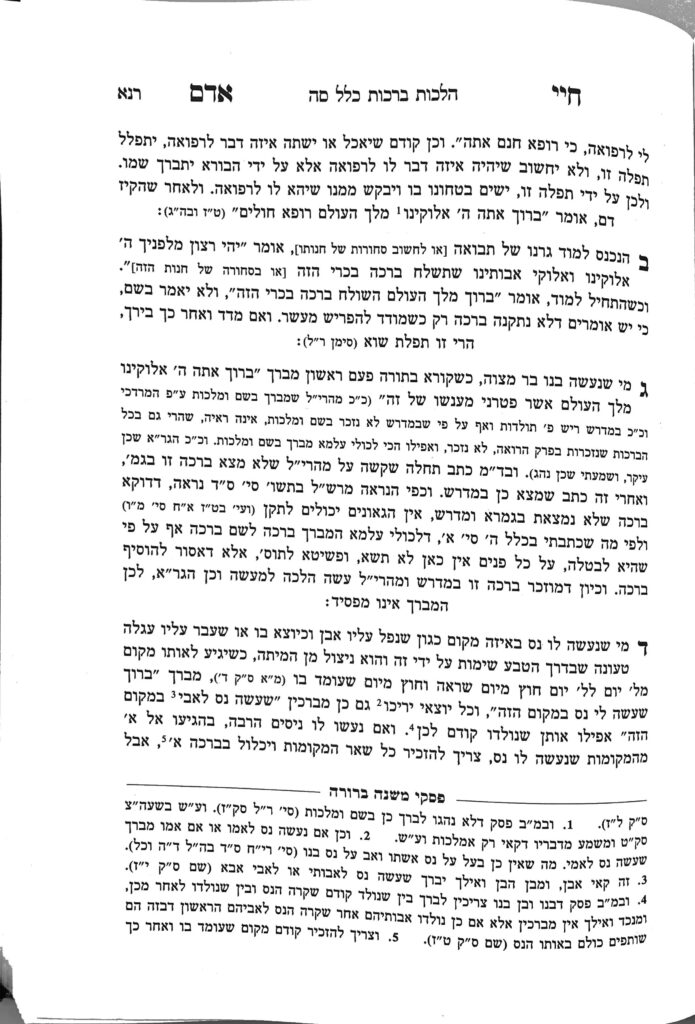We are continuing in siman 3, discussing the bracha of baruch shepitrani. We expanded the discussion to learn about whether brachos which are not mentioned in the Gemara can be instituted later on by the Geonim and Rishonim. The Chayei Adam concluded that a person is not obligated in this bracha, but may recite the bracha with Hashem’s name if they wish.
We then raised the question of whether the bracha is recited on a daughter becoming a bas mitzvah. To answer the question, we discussed two possible reasons behind the bracha. The first is that the bracha is for the father having culminated his responsibility of chinuch towards his son. The second is that since the child can no longer be punished for the father’s mistakes, the bracha is for the fact that the father will no longer be punished for having caused pain to their child.
Today, we will discuss how these reasons apply to the question of reciting the bracha on a bas mitzvah.
If the reason behind the bracha of baruch shepitrani is the second reason, that children under bar and bas mitzvah can be punished for their father’s aveiros, which in turn can cause the father to be punished for bringing punishments upon his children, and the purpose of the bracha is to recognize that the children will no longer be punished, the bracha would apply equally to both sons and daughters.
However, if the reason for the bracha is based on the chinuch responsibilities of the father, we will learn in the next Klal that the chinuch obligations to a son are different than toward a daughter. It could be argued that the obligations are so different, one should not recite the bracha on a daughter.
Therefore, out of safeik, one who has the minhag to recite baruch shepitrani with Hashem’s name on a son would not do so on a daughter.
Those who anyways recite the bracha on a son without Hashem’s name can recite the bracha on a daughter in the same way they would on a son.
It is important to note that the bracha is recited on the culmination of a father fulfilling their chinuch responsibilities. The implication is that if one were deficient in their child’s chinuch, they will be held responsible, to a certain extent, for their child’s deficiencies in adulthood.
Rav Shlomo Zalman Auerbach ztl concludes from this point, that, nowadays, no one should recite the bracha with Hashem’s name.
Regarding twins, the language of the bracha is in the singular form, and therefore one would recite one bracha per twin.
Rav David Yosef writes that when a father is absent the chiyuv chinuch falls on the mother. Therefore, she would recite the bracha in lieu of the father, and would even say Hashem’s name if that was her minhag. However, adoptive parents would not recite Hashem’s name, as they do not have the same level of chiyuv of chinuch that the parents have.
As we learned yesterday, the most appropriate time to recite this bracha is at a time when the family is publicly demonstrating that the child is now a gadol. Since a child under bar mitzvah can not lain nor receive an aliyah, the change of status is demonstrated by the fact that the child is now receiving an aliyah.
However, although we no longer follow this practice, the halacha is that a child under bar mitzvah can receive the maftir aliyah, and lain the haftorah for the tzibbur. Thus, it would seem strange to make the bracha after the bar mitzvah boy receives the maftir aliyah, as he would technically have been allowed to receive it before his bar mitzvah as well. Therefore, the poskim suggest that if the child is laining the entire parsha, the parent should make the bracha after the first aliyah that he lains.
Summary
- One recites the bracha baruch shepitrani on a daughter without Hashem’s name according to all opinions.
- Rav Shlomo Zalman Auerbach ztl held that nowadays, one should recite the bracha on a son without Hashem’s name as well.
- If one has twins, the bracha is recited on each individually.
- If there is no father to recite the bracha, the mother can make the bracha, and recite Hashem’s name if that is her minhag. Adoptive parents do not recite Hashem’s name.
- If one is reciting the bracha on a son, and the son is laining more than just maftir and haftorah, it is preferable to recite the bracha after the first of those aliyos.



